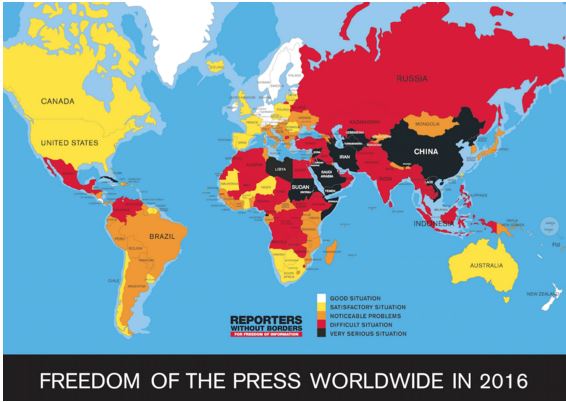
Press release
Media freedom has declined steadily in the post-Soviet states. Nearly two thirds of the region’s countries are ranked around 150th or lower in the Index and their scores keep on falling.
The fact that Russia (148th, up 4) improved its ranking slightly should not raise hopes because its score fell as a result of the persecution of critics, which has reached levels not seen for three decades. And Russia’s behaviour has legitimized the growing repression throughout the region because Moscow acts as a regional “model,” albeit a negative one as regards media freedom.
Beset by economic and security threats, the region’s authoritarian regimes seemed to know only one response – tightening the screw – although their crackdowns just fuelled more tension. In Tajikistan (150th, down 34), which fell furthest in the Index, President Emomali Rahmon used “counter-terrorism” as grounds for gagging critics and consolidating his personal power, and in so doing jeopardized the fragile national consensus.
Brandishing imaginary threats and the resulting need for stability to justify holding on to power is the favourite pastime of the eternal despots in Uzbekistan (166th), Kazakhstan (160th), Turkmenistan (178th), Azerbaijan (163rd) and Belarus (157th). The regional economic crisis, the shockwave from the Ukrainian revolution and in some cases the uncertainty surrounding an approaching succession provided further grist to their mill. Not content with having long suppressed all expression of discontent, these regimes tightened their grip on Internet users and hounded the few remaining independent journalists.
After plummeting in the 2015 Index because of the Maidan crackdown and the fighting in the east, Ukraine (107th) has jumped 22 places in the latest Index thanks to a significant decline in violence and to some long-awaited reforms. But major challenges remain, starting with the oligarchs’ grip on the media and the “information war” with Russia. There was little change in the four regional countries that continued to be ranked best: Georgia (64th), Armenia (74th), Moldova (76th) and Kyrgyzstan (85th). Aside from the disparities in the situation of each of these four countries, media polarization and the lack of media independence are major challenges that they all share.
Located on its southwestern edge, Turkey (151st) suffered the region’s second biggest fall in score because of the turmoil resulting from the Syrian conflict and the resumption of fighting with the PKK Kurdish rebels. President Recep Tayyip Erdogan’s growing authoritarianism and the paranoia displayed by the authorities just deepened the fault lines in an already polarized society.


